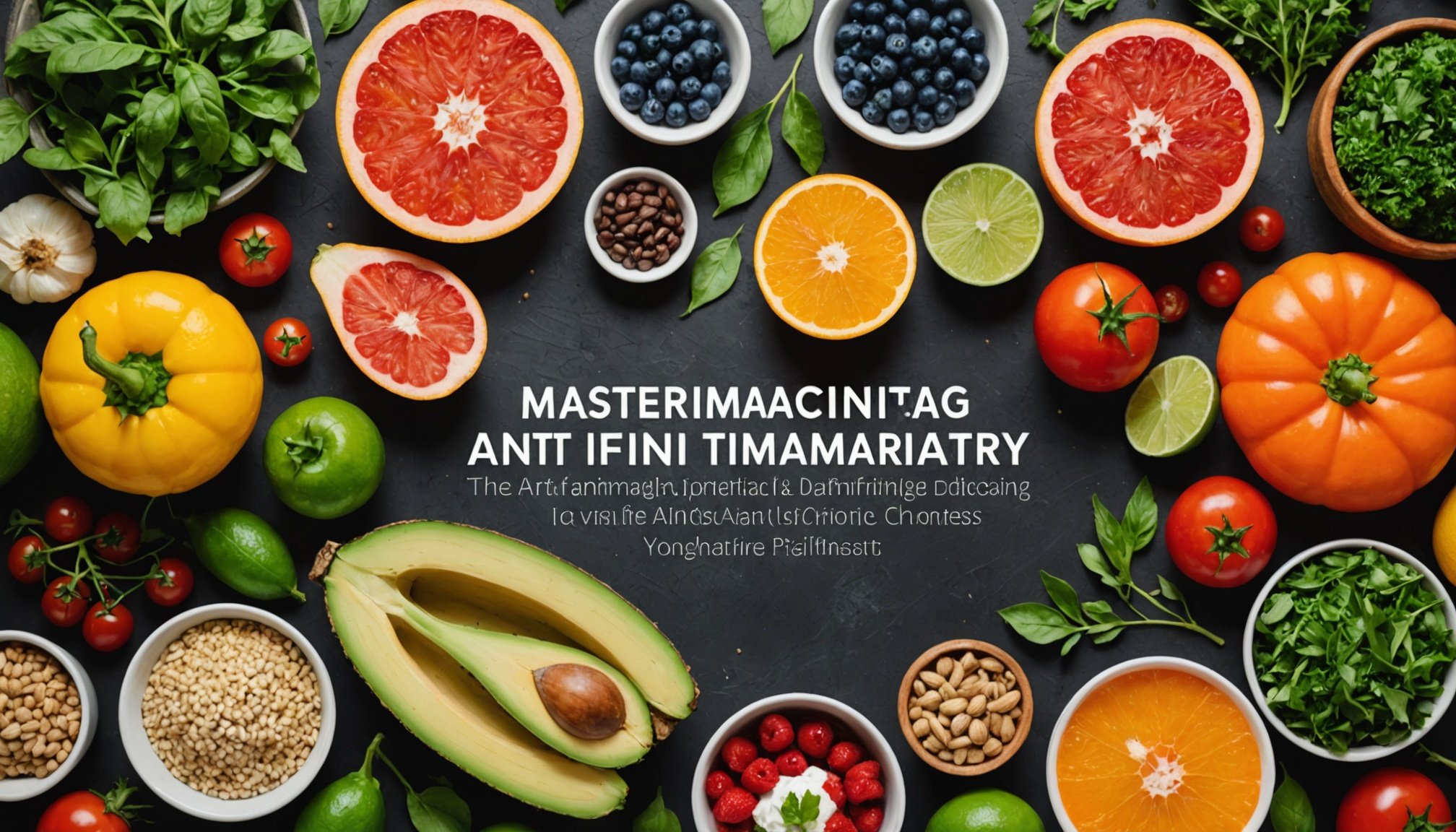Understanding Anti-Inflammatory Diets
Anti-inflammatory diets focus on reducing inflammation in the body, which plays a crucial role in managing chronic illness. The fundamental principle is to incorporate foods that diminish inflammation and exclude those that exacerbate it. The Anti-Inflammatory Diet Principles highlight foods rich in antioxidants, omega-3 fatty acids, and fiber. These components are instrumental in combating inflammation and supporting overall health.
Inflammation is the body’s natural response to injury or infection, but when it becomes chronic, it can lead to various health issues. Chronic illnesses such as arthritis, heart disease, and diabetes often have an inflammatory basis. Therefore, addressing inflammation through diet can be an effective strategy for managing these conditions.
Also read : Transforming Urban Spaces: The Benefits of Indoor Vertical Gardens on Air Quality and Mental Wellness
Key dietary components that help reduce inflammation include a wide variety of fruits and vegetables, particularly those rich in vitamins and minerals. Whole grains such as oats and brown rice are beneficial for maintaining stable blood sugar levels and providing essential nutrients. Meanwhile, healthy fats found in nuts, seeds, and olive oil support heart health and reduce inflammation.
Understanding these principles and components is essential for anyone looking to modify their diet for health improvement or chronic illness management. By emphasizing anti-inflammatory foods, individuals can promote healing and vitality.
Also to discover : Revitalize Your Wellness: Unleashing the Power of Outdoor Boot Camps for a Fitness Revolution
Major Anti-Inflammatory Foods
When considering an anti-inflammatory diet, understanding which foods actively combat inflammation is crucial. While some foods invigorate your body, others may lead to unwanted inflammatory responses. Integrating the right nutrients into your daily meals can make a significant difference in your overall health.
Vegetables and Fruits
Some of the best anti-inflammatory foods come in the vibrant hues of vegetables and fruits. Berries, spinach, and kale are particularly rich in antioxidants, thus helping to reduce inflammation. These nutrient-rich foods are abundantly supplied with vitamins, protecting against chronic illnesses.
Whole Grains
Whole grains like quinoa and oats are excellent sources of fiber, which aids in maintaining digestive health and stable blood sugar levels. This fiber content acts as a shield, guarding against inflammation and providing relief from chronic illness symptoms.
Healthy Fats
Incorporating healthy fats into your diet can yield substantial health benefits. Nuts, seeds, and olive oil harbor omega-3 fatty acids essential for heart health and inflammation reduction. These fats not only enhance the flavour of dishes but also contribute to the body’s defense mechanisms against chronic conditions.
Delicious Anti-Inflammatory Recipes
Embarking on an anti-inflammatory diet doesn’t mean saying goodbye to flavourful meals. In fact, anti-inflammatory recipes offer a delectable approach to maintaining health. The balance of taste and nutritional value is key, and each recipe is designed to delight your taste buds while promoting wellness.
Breakfast Options
Start your day with a nutritious breakfast that packs a punch. Consider overnight oats topped with fresh berries and a sprinkle of chia seeds, which provide essential omega-3s. Another option is a smoothie bowl filled with spinach, mango, and almond butter—a vibrant way to boost morning energy while reducing inflammation.
Lunch and Dinner Ideas
For lunch, savour a quinoa salad with mixed greens, cherry tomatoes, and avocado—a refreshingly satisfying meal loaded with anti-inflammatory properties. For dinner, try grilled salmon dressed in lemon and dill, accompanied by a side of roasted sweet potatoes and a sprinkle of turmeric. These dishes offer a harmonious blend of flavours and inflammation-fighting nutrients.
Snacks and Desserts
Healthy snacks can be both tasty and beneficial. Munch on a handful of walnuts or enjoy an apple with almond butter. For dessert, whipped coconut cream with dark chocolate shavings caters to both your sweet tooth and your desire to adhere to an anti-inflammatory diet.
Benefits of Anti-Inflammatory Diets for Chronic Illnesses
Adopting an anti-inflammatory diet offers significant health benefits, particularly for those managing chronic illnesses. Scientific studies have consistently shown that such diets can lead to tangible improvements in conditions such as arthritis, heart disease, and chronic illness relief. By reducing inflammation, these diets help alleviate common symptoms associated with chronic conditions, providing both physical and psychological benefits.
Numerous case studies illustrate the positive outcomes of this dietary approach. Patients have reported decreased joint pain, improved cardiovascular health, and even enhanced mental clarity. These improvements showcase the profound impact an anti-inflammatory diet can have on well-being.
Psychologically, adhering to this type of diet instills a sense of control over one’s health. It empowers individuals to make dietary choices that not only nourish them but also combat inflammation at its root. The diet can be a motivating factor, encouraging lifestyle shifts that contribute to holistic health.
Health benefits of anti-inflammatory diets extend beyond mere symptom control. They foster an overall healthier lifestyle, encouraging mindfulness about food choices and promoting long-term wellness. Thus, adopting an anti-inflammatory diet is a proactive strategy for both preventing and managing chronic illness symptoms.
Tips for Adhering to an Anti-Inflammatory Diet
Embarking on an anti-inflammatory diet can be transformative, but consistency is key. To seamlessly incorporate these dietary changes, start by integrating anti-inflammatory foods gradually into your meals. Begin with simple swaps, such as replacing refined grains with whole grains or using olive oil instead of butter.
Dining out or attending social gatherings might seem challenging. However, preparing beforehand by checking menus or suggesting restaurants with healthier options can alleviate stress. Opt for dishes rich in vegetables, lean proteins, and healthy fats, ensuring you stick to your dietary principles even when away from home.
The journey to a sustainable anti-inflammatory lifestyle is more effective when approached gradually. Implement changes one step at a time, allowing yourself to adapt to new eating habits without feeling overwhelmed. Building a supportive community can also play a vital role. Sharing experiences with others pursuing similar goals can provide encouragement and accountability.
Tracking your progress with a food diary can be beneficial, reflecting on how dietary choices impact your health and mood. Embrace flexibility and remember that perfection isn’t the goal—continued commitment to healthier choices will yield significant benefits over time.
Sample Meal Plans for an Anti-Inflammatory Diet
Crafting a diet menu with anti-inflammatory benefits ensures you enjoy a diverse, nourishing culinary experience. Here’s a streamlined one-week meal plan to effectively integrate anti-inflammatory foods into your routine.
-
Day 1: Breakfast with overnight oats topped with fresh berries. Lunch includes a spinach and quinoa salad with an olive oil dressing. Dinner features grilled salmon with steamed broccoli.
-
Day 2: Start with a smoothie bowl filled with mango and kale. For lunch, try a chickpea and avocado wrap. Dinner can be a stir-fry with brown rice and mixed vegetables.
-
Day 3: Begin with a chia pudding topped with almond butter. Enjoy a lentil soup for lunch. For dinner, roasted sweet potatoes and a side of kale salad.
Tips for grocery shopping: Opt for fresh vegetables, whole grains, and lean proteins. Select seasonal produce for better taste and cost-effectiveness. A weekly list helps streamline the process, ensuring a balanced variety and managable meal prep.
Balancing both nutrition and flavour ensures your meal plan remains engaging and satisfying. Adjust portions and ingredients for personal preferences, and incorporate seasonal items to keep meals exciting and catered to personal tastes.
Personal Testimonials and Case Studies
Delving into success stories unveils the transformative impact of anti-inflammatory diets. Individuals have shared how these diets improved their health, offering invaluable insights into its effectiveness. One such testimonial comes from Jane, who battled severe arthritis. After adopting an anti-inflammatory diet rich in whole grains and nutrient-rich foods, she experienced noticeable relief in joint pain and stiffness.
Case studies further bolster evidence of prolonged benefits. Consider a research study involving participants with chronic heart disease. Following an anti-inflammatory diet led not only to reduced inflammation markers but also enhanced cardiovascular health. Such improvements highlight the practical applications of these dietary choices.
Beyond individual testimonies, community support plays a significant role in maintaining chronic illness relief. Engaging with groups focused on chronic illness management can provide camaraderie and motivation. These communities often share practical anti-inflammatory diet principles, offering meal swaps or shared grocery lists that simplify adherence.
These personal experiences underscore the profound impact diet can have on life quality. Embracing a network of supportive peers encourages individuals to remain committed, nurturing a path to better health and well-being through dietary changes. This collective journey amplifies both the psychological and physiological benefits of an anti-inflammatory lifestyle.
Expert Interviews and Insights
When diving into nutrition expert advice, it’s essential to gain insights from professionals passionate about chronic illness management. Understanding their perspectives can empower you to make informed dietary choices.
Interview with a Nutritionist
A qualified nutritionist is pivotal in explaining how anti-inflammatory diets can address specific health concerns. Through their expertise, they underline the significance of prioritizing whole foods, including a range of nutrient-dense ingredients such as fresh fruits, vegetables, nuts, and lean proteins. These components reduce pro-inflammatory biomarkers, thus aiding in managing chronic conditions like arthritis and heart disease.
Insights from Healthcare Providers
Healthcare providers also stress the impact diet has on managing and preventing chronic illnesses. Through a patient-centric lens, they observe how dietary changes can lead to symptom alleviation and improved quality of life. For those navigating the complexities of chronic illness, these professionals emphasize the psychological and health benefits of anti-inflammatory diets.
Such comprehensive insights help demystify the process of incorporating anti-inflammatory principles into daily life. By leveraging the wisdom of experts, individuals are better equipped to embark on a transformative dietary journey, fostering a proactive and informed approach to health.
Scientific Evidence on Anti-Inflammatory Diets
Scientific research supports the effectiveness of anti-inflammatory diets in managing and even alleviating chronic illness symptoms. Studies have revealed that these diets rich in whole foods like fruits, vegetables, and healthy fats can markedly reduce inflammation markers. This scientific backing suggests incorporating such foods can significantly lessen chronic condition symptoms, presenting an accessible supplement to medical treatments.
Recent Studies and Findings
Recent research findings illustrate the profound impact of anti-inflammatory eats on chronic illnesses. These studies consistently highlight how nutrient-rich foods can reduce inflammation and alleviate conditions such as arthritis and cardiovascular diseases. The data often showcase reductions in inflammatory biomarkers, marking a tangible impact on health monitoring.
Meta-Analyses and Reviews
Meta-analyses further underline that anti-inflammatory diets can enhance overall wellness. Reviews consolidate various studies, confirming significant improvements in patients’ chronic illness management. By pooling results from multiple research studies, meta-analyses offer robust evidence to support these dietary interventions.
Expert Insights
Nutrition experts ardently emphasize choosing anti-inflammatory dietary practices. Their insights shed light on selecting nutrient-dense protein, fiber, and healthy fats. These choices can undermine pro-inflammatory processes, fortifying the body’s resistance against chronic diseases. Such expert advice is indispensable in promoting a healthier, more balanced lifestyle through diet.
Tips for Adhering to an Anti-Inflammatory Diet
Embracing an anti-inflammatory diet involves incorporating dietary changes that may feel daunting at first. Employing practical diet adherence strategies can ensure a smoother transition.
Begin by gradually integrating anti-inflammatory foods like substituting refined grains with whole grains. These simple adjustments aid the body in adapting to healthier choices, paving the way for sustainable change. When dining out or attending social gatherings, consider menu planning ahead. Focus on select dishes rich in vegetables, lean proteins, and healthy fats, adhering to dietary principles effortlessly.
Gradual lifestyle changes can foster long-term success. Approach the process incrementally, giving yourself time to acclimatise to new eating patterns without feeling overwhelmed. Building a support network encourages lifestyle changes. Sharing experiences with others on a similar journey can offer motivation and accountability, which are fundamental in sustained adherence.
Tracking progress through a food diary provides insights into how dietary adaptations affect health and mood. Embrace flexibility, remembering that achieving perfection isn’t the goal; the aim is a continued commitment to healthier choices. Consistency over perfection will yield significant health benefits over time, ultimately fostering a profound connection between dietary habits and improved well-being.






